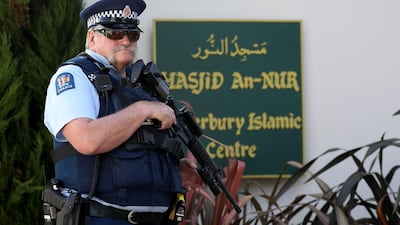When United Nations secretary general Antonio Guterres declared in a New York mosque earlier this month that "Mosques and all places of prayer and contemplation should be safe havens, not sites of terror", it came in the wake of the Christchurch massacre, a terrorist attack that has shaken the world that has shaken the world. Following the killings of 50 innocent worshippers in New Zealand, Britain and Australia have pledged to allocate millions to protect mosques. That is all well and good – but we have a much bigger task at hand than guarding mosques with police. If we do not recognise that, this problem at best continues for much longer and, at worst, it deepens and broadens in scope.
Of course, places of worship need to benefit from state protection, if that is what they want. They might, however, not want that. Many communities across the world have rather bad experiences with different police establishments and that trust has to be rebuilt, with full accountability as a bedrock.
The British political activist Ash Sarkar pointed to that when she tweeted: "Islamophobia isn't just an expression of hatred towards the Islamic faith: it's structural, and overlaps with borders, immigration policy and everyday policing. When we make the demand for the state to protect Muslims from Islamophobia, it could do worse than starting with itself."
Others might recall the 2012 lawsuit against the New York City Police Department for illegally spying on Muslims by infiltrating student groups and planting informants in mosques. Not all communities have those experiences, and some will choose to overlook them in the short term, because of the overriding threat they see from not having a police presence surrounding them. That is their choice to make.
But, beyond that, police protection is not the greatest issue. On the contrary – if police protection is necessary, then we have already failed. Places of worship should be sacrosanct. They should never be viewed as political symbols to be manipulated in some way, yet that kind of manipulation is widespread.
I have written extensively about how the instrumentalisation of religion for partisan purposes brings religion into disrepute, irrespective of whom it is done by, including Islamists and anti-Islamists. But far more relevant right now is the appropriation of mosques as political tools by those targeting Muslim populations. Witness, for example, the control of permits and shutdowns preventing Palestinian worshippers from going to Al Aqsa mosque in Jerusalem by the Israeli occupation.
When the terrorist attack happened in New Zealand, it was not simply an assault on the country, exploiting its vulnerabilities. It was a direct declaration of war on Muslims of the western world. The terrorist made that very clear in his own manifesto. Attacking Muslims at prayer in a mosque was the ultimate expression of that targeting. On the street, it might not always be easy to identify a Muslim. But when one wants to make Muslims a target, the one place they are sure to be found is the mosque, and thus a place of worship is politicised in the most grim fashion.
When non-Muslim women donned the headscarf in New Zealand in an expression of solidarity with the Christchurch victims, they did so in recognition of the hijab, like the mosque, being one of the most obvious and visible expressions of Islam and being a Muslim.
But if the expression of solidarity begins and ends with wearing a headscarf, or sending police to stand guard at places of worship, the work is at best, incomplete and at worst, a distraction. Muslim women in hijab will not cease to be targeted by bigots because, on a single day, non-Muslim women chose to wear the scarf.
Rather, religious hatred needs to be continually challenged, in all sectors of society, to prevent churches, mosques and other places of worship being targeted across the world. Basic sectarianism must be addressed as one of the root causes.
The sanctity of places of worship is universal, and their perception as targets centuries-old. Today, we might primarily talk about mosques in the West. Yesterday, it might have been churches across Europe and the East. It is, tragically, all too likely that tomorrow, the focus might have moved to another religious target. To make that less likely over time, we have to recognise that there is a wider bigotry festering in our societies, be it sectarianism in some Muslim-majority societies or anti-Muslim bigotry in the West.
If we do not recognise that link, then we have failed to learn the real lesson of the Christchurch massacre, which is that the terrorist responsible did not emerge from a vacuum. Rather, he fed off of existing discourses and rhetoric that exist all around us, and must be tackled.
Dr HA Hellyer is senior associate fellow at the Royal United Services Institute and the Atlantic Council


